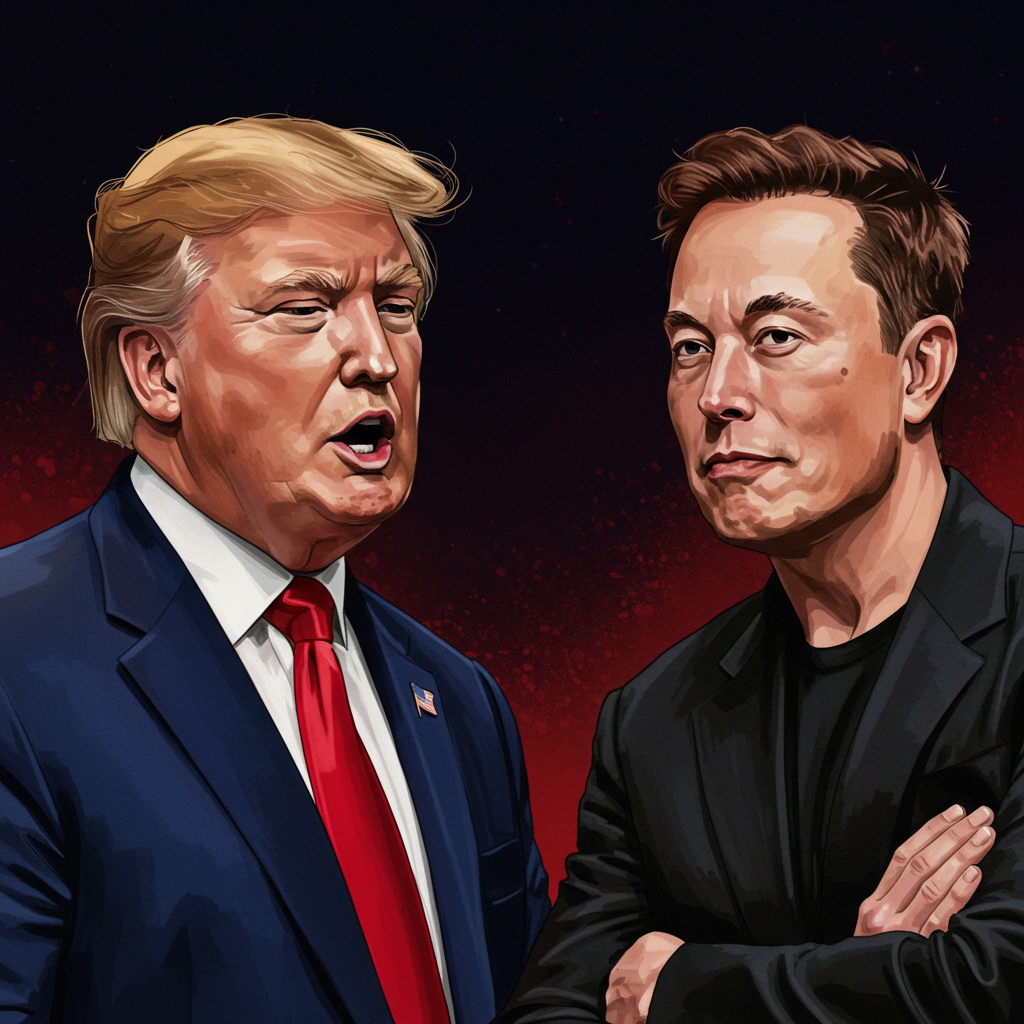A fiery public dispute between former US President Donald trump and tech billionaire Elon Musk is reigniting, centered squarely on Trump’s massive proposed budget plan, dubbed the “big, beautiful bill.” This latest clash sees Trump suggesting he could weaponize a cost-cutting agency, the Department of government Efficiency (DOGE)—an entity Musk himself helped establish—against the billionaire’s businesses.
The escalating tension underscores deep ideological rifts, even among former allies, regarding government spending, national debt, and fiscal policy direction. As Congress deliberates the complex legislation, the public spat highlights the high stakes and intense political maneuvering surrounding its potential passage.
Trump Threatens Musk With Government Efficiency Agency
The recent exchange exploded online, with Trump launching an unexpected broadside against Musk. He took to social media, alleging Musk has benefited immensely from government assistance. “Elon may get more subsidy than any human being in history, by far,” Trump asserted. He then dramatically suggested a potential course of action: “Perhaps we should have DOGE take a good, hard, look at this? BIG MONEY TO BE SAVED!!!” This pointed remark implied the very agency created to identify government waste could be directed to scrutinize the finances of a man once close to his administration.
This wasn’t the first time Trump hinted at using DOGE against Musk. Previously, he colorfully described the agency as “the monster that might have to go back and eat Elon,” specifically mentioning the substantial subsidies Musk receives. Trump has explicitly threatened to strip away government subsidies that benefit Musk’s vast network of companies, which span electric vehicles, space exploration, and more.
Musk Fires Back: Call to “CUT IT ALL”
Musk quickly retorted, taking to his own social platform, X. His response was direct and pointedly contrary to Trump’s focus on specific subsidies. “I am literally saying CUT IT ALL. Now,” Musk declared. This stance aligns with his repeated criticisms of Trump’s budget proposal, which he argues undermines the very goals he pursued while briefly involved with the administration, particularly efforts to reduce government spending.
Musk’s opposition stems from a core ideological commitment to fiscal conservatism. He contends the proposed bill would significantly balloon the national debt. The non-partisan Congressional Budget Office (CBO) estimates the bill could add an alarming $3.3 trillion (£2.4 trillion) to the national debt burden. Musk has publicly showcased graphs illustrating the upward trajectory of US debt, questioning pointedly, “When are they going to flatten this curve?”
The “Big, Beautiful Bill” and Its Fiscal Impact
The “One, Big, Beautiful Bill Act” is a lengthy, nearly 1,000-page piece of legislation central to President Trump’s agenda. It proposes substantial spending increases in key areas such as border security, national defense, and domestic energy production. However, these increases are intended to be partially offset by controversial cuts to crucial social programs, including healthcare for lower-income Americans and food support initiatives.
A significant driver of the bill’s estimated impact on the national debt is its provision to extend roughly $3.8 trillion in tax cuts enacted during Trump’s previous term. While the President and his allies argue the bill will spur economic growth and cut waste, critics like Musk focus heavily on the projected multi-trillion-dollar addition to the national debt. Estimates from the CBO suggest that the proposed cuts could lead to nearly 12 million Americans losing health insurance coverage, adding further controversy.
Legislative Battles and Republican Divisions
The proposed budget bill faces a challenging path through Congress, despite Republicans holding majorities in both the House and the Senate. Internal divisions within the Republican party, particularly over the extent of cuts to welfare programs required to finance tax cut extensions, have created significant obstacles.
The Senate recently endured a marathon “vote-a-rama” session, lasting over 24 hours, as senators debated and voted on numerous amendments. The process highlighted deep rifts, with several Republican senators voicing strong objections to the bill’s current form, primarily citing concerns about the national debt and specific program cuts. At least four Republican senators—Susan Collins, Thom Tillis, Lisa Murkowski, and Rand Paul—have publicly stated they cannot support the bill as written. Given the Senate’s narrow Republican majority, leadership can only afford three defections to pass the bill without Democratic support, requiring intense negotiations to secure the necessary votes.
The House of Representatives previously passed its version of the bill by an extremely narrow margin of just one vote, indicating the difficulty it may face upon receiving the Senate’s version. President Trump had initially pushed for a July 4th signing deadline, but the Senate stalemate has led him to concede that meeting that target will be “very hard.”
The DOGE Agency Explained
At the center of Trump’s threat is the Department of Government Efficiency (DOGE). This agency was established with the stated mission of identifying and eliminating wasteful government spending and streamlining federal operations. Elon Musk was notably involved with DOGE’s early formation and leadership, tasked with finding ways to implement spending and job cuts within the government. His departure from the role was reportedly “acrimonious,” occurring publicly over his disagreements with aspects of the “big, beautiful bill,” particularly its implications for increasing national debt rather than cutting spending.
Clash Over EV Incentives and Musk’s Political Threats
Trump has speculated publicly that Musk’s opposition to the bill is primarily motivated by specific provisions that would eliminate incentives for purchasing electric vehicles (EVs), a sector dominated by Musk’s company, Tesla. Trump has claimed Musk is “upset that he’s losing his EV mandate” and warned he “could lose a lot more than that,” referencing the broader subsidies his companies receive.
Musk has pushed back against this specific claim. He reposted a video clip from a past interview where he stated that removing EV incentives would actually improve Tesla’s “competitive position significantly.” This suggests his opposition is rooted in broader fiscal principles rather than narrow business interests.
Beyond social media barbs, Musk has taken more overt political steps. He sharply criticized members of Congress who he believes campaigned on reducing spending but then voted for what he termed the “biggest debt increase in history,” stating they “should hang their head in shame!” He has gone further, threatening to actively work against such lawmakers in their upcoming primary races, stating, “they will lose their primary next year if it is the last thing I do on this Earth.”
Musk has also revived the idea of forming a new political entity, the “America Party,” to challenge the traditional Republican and Democratic structure. He argues the country needs an alternative to the “Democrat-Republican uniparty” to better represent the majority of Americans. This potential move comes despite Musk previously contributing significantly to Trump’s re-election bid.
The White House has appeared to dismiss Musk’s “America Party” idea. Stephen Miller, Deputy Chief of Staff for Policy and Homeland Security Advisor, publicly characterized the concept as a “libertarian delusion,” suggesting it lacks a significant political constituency.
This renewed public feud between Trump and Musk highlights the intense debate surrounding the nation’s fiscal future and the complex political landscape as Congress grapples with passing a contentious budget bill with significant economic implications.
Frequently Asked Questions
What is the core disagreement between Trump and Musk regarding the budget bill?
The primary disagreement centers on government spending and national debt. Trump’s proposed “big, beautiful bill” includes spending increases and extends tax cuts, projected to add $3.3 trillion to the national debt. Trump accuses Musk of opposing the bill due to potential loss of EV subsidies. Musk counters that he is ideologically opposed to the bill because it increases the national debt significantly, contradicting his desire to “CUT IT ALL.”
What is DOGE, the government agency mentioned by Trump?
DOGE stands for the Department of Government Efficiency. It was established during the Trump administration with the goal of identifying and eliminating wasteful government spending. Elon Musk was briefly involved in leading this agency, tasked with finding ways to implement spending and job cuts within federal departments before his departure over disagreements related to the proposed budget bill. Trump has suggested using DOGE to investigate the subsidies received by Musk’s companies.
What political actions is Elon Musk threatening to take if the budget bill passes?
If the “big, beautiful bill” passes, Elon Musk has publicly threatened to actively campaign against members of Congress who vote for it, specifically targeting their primary races next year. He criticized lawmakers who campaigned on reducing spending but voted for the bill’s debt increase. Musk has also floated the idea of establishing a new political party, potentially called the “America Party,” to offer an alternative to the current Republican and Democratic parties.
Conclusion
The escalating feud between Donald Trump and Elon Musk over the proposed “big, beautiful bill” is more than just a personal spat; it reflects fundamental disagreements about the direction of U.S. fiscal policy. As Congress navigates the complex legislative process and internal party divisions over spending cuts, tax extensions, and the ballooning national debt, the public clash between these two prominent figures adds a unique layer of political drama. Musk’s threats of political retribution and establishing a new party signal potential realignments, while Trump’s counter-threats involving government agencies underscore the high stakes involved. The outcome of the bill’s passage and the continuation of this influential feud will undoubtedly shape future political and economic debates.



